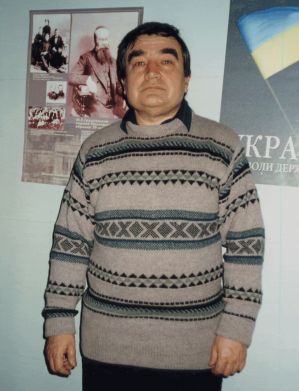Writer. In his student years (1968), he published an uncensored literary almanac.
Born into a family of rural intelligentsia. His mother, Hanna Serhiivna, worked as a primary school teacher. His paternal grandfather, Hnat, was executed in 1938.
Mykola graduated from school with a medal and in 1965 enrolled in the Ukrainian Philology department at Odesa State University, named after I. Mechnikov. He wrote poetry.
In the spring of 1968, a group of philology students published a typewritten literary almanac called “Kolo” (The Circle) in four copies. It included published poems by M. Vinhranovsky and Lina KOSTENKO, as well as poems by Odesa poets. S. wrote a short article for the almanac titled “Long Live the First of May!”—an appeal to young people, wishing them to be more honest and active, and to build their lives on new principles—more active and purer.
The leadership of the philology department and the university was alarmed by the very fact of an uncensored publication. Party organizer Leon Khachykovych Kalustian personally came to the dormitory and interrogated S. about the almanac. In subsequent interrogations, they tried to force him to admit Oleksa RIZNYKIV's involvement in the publication. It was established that the almanac had been published by Ukrainian philology students S., senior student Tetyana Ananchenko, and Russian philology student Yevhen Aksarin.
It later became known that someone had reproduced the almanac “Kolo” in several dozen copies, and it gained considerable publicity in Odesa. In the oblast Komsomol committee, reports began to circulate: “Young Ukrainian nationalism has reared its head at Odesa University.”
However, the matter of the almanac was “hushed up.” Although it was later said that if it had occurred after the Soviet invasion of Czechoslovakia, the authors would have certainly been expelled from the university. In the autumn, law students came to S.’s dormitory room with provocative questionnaires from a non-existent “Organization of August 21, 1968.”
S. earned top grades (“5”) for half of his semesters and was supposed to receive a personal scholarship, but he received neither the scholarship nor a recommendation for postgraduate studies. His professor, Vasyl Fashchenko, advised him to get a job somewhere to “lie low.”
In 1970, S. worked for several months as an instructor at the oblast Komsomol committee, then taught school in the Peresyp district of Odesa, served a year in the army, and taught in the Bulgarian village of Vynohradivka, Tarutyne Raion, Odesa Oblast, where his wife was from. There, he was interrogated by a KGB officer about the mood of the peasants and whether any riots or protests were being prepared.
He worked at the “Mayak” publishing house and at the newspaper “Dumska Ploshcha.” He has been a member of the Union of Writers of Ukraine since 1979. He has published several books of short stories, novellas, and poems. In 1990, he provided a recommendation for Oleksa RIZNYKIV to join the Union of Writers of Ukraine (SPU) and helped publish his first book.
Bibliography:
Kharkiv Human Rights Protection Group Archive: interview from February 12, 2001.
Interview with Mykola Mykhailovych Sukhovetsky // The Odesa Wave-4: Documents, Works, and Memoirs of Prisoners of Conscience. Compiled by P. Otchenashenko, O. Riznykiv, D. Shupta. Odesa: Druk, 2009, pp. 235-242.

Sukhovetskyy